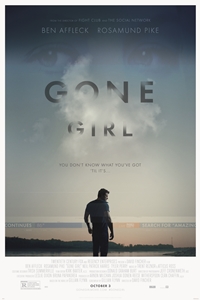 Gone Girl
Gone Girl
Starring Ben Affleck, Rosamund Pike, Neil Patrick Harris, Tyler Perry, Carrie Coon, and Kim Dickens
Directed by David Fincher
Rated R
Run Time: 149 minutes
Genre: Mystery/Thriller
Opens October 3rd
By Eric Forthun of Cinematic Shadows
Gone Girl opens and closes on the same haunting shot, as one emphasizes an eerie voiceover while the other primarily focuses on a person in the frame. It's only one of the many devastatingly effective tactics in David Fincher's film, a twisty, manipulative, compulsively gripping story of the disintegration of a marriage and the search for a wife gone missing. The titular character is Amy Dunne (Rosamund Pike), whose husband Nick (Ben Affleck) used to work as a journalist before both him and his wife lost their jobs due to recession downsizing. Nick's departure from his house one day seems just like every other, but upon his return he notices a glass table broken, signs of a struggle, and a missing wife. Something went horribly wrong. The police begin to investigate and realize that things don't add up: Nick's strange, ambivalent behavior signifies psychopathic leanings while his portrayal of a blissful marriage and a friendless, quiet Amy shows that their coupling has some mysteries.
The story gains mainstream media attention and cable news eats up the story, accusing Nick of murdering his wife while suspicion increasingly leads toward a domestic incident. Did Nick Dunne kill his wife? That forms the framework for the film and propels the action forward slowly and methodically. Nick and Amy's marriage gets assessed through flashbacks as the audience sees the couple through a manipulated lens from an untrustworthy point-of-view, considering the deceit that continues to unravel over the film's duration. Yet the beginning of their love was strong and resonant for both, with passion in both of their hearts and a sex-filled romance that never let up. Gillian Flynn's script loyally follows her novel while economically cutting the pieces that need to be tossed, even if that means discarding much of the social commentary that went along with the couple's dismantling. The semblance of economic hardships leading to a frustrated, desperate marriage only graze the surface of Fincher's overarching cinematic themes.
Yet the central twist of the film, if that is even the appropriate term for such an important plot development, lays the fabric for the film's drive and makes the story all the more rapid-fire and confident. Fincher and his longtime editor, Kirk Baxter, make a wholly unique narrative through the splicing of the flashbacks and the rest of the narrative in the second half. Scenes take longer to develop and spend more time on characterizations and exchanges in the film's opening moments, providing a lack of urgency and feeling melodramatic. That's undoubtedly intentional considering the tonal change the editing creates in the second half, as scenes become more economical and rigid in style, with compact, airtight moments emerging in the sea of mystery. It's startlingly effective filmmaking. The music by Reznor and Ross, their third collaboration with Fincher after their Oscar-winning The Social Network and nominated The Girl with the Dragon Tattoo, is their most subtle and moody to date, staying quiet only to pounce when needed.
The reason Gone Girl clicks and unravels with such vivacity and deranged power is Rosamund Pike. She delivers a compellingly chilled performance that uses her dynamic voice to mesmerize and trick the viewer. The film grows into a cat-and-mouse style affair that works because of her energy and confidence; she is a bold, strong woman that fights for herself and stands as one of Fincher's strongest female characters to date. Affleck is perfectly cast and demonstrates his magnetism as a star power in today's business, hiding plenty underneath his calm demeanor to show the capabilities of a man trapped in a publicized struggle with an equally powerful wife. Even if the film briefly addresses the social issues that work within the dynamics of the film and only briefly captures the manner in which media can consume, contort, and control a high-profile case, Fincher still brings his touch to this 149-minute criminal investigation of suburban hell. The film's cinematographer, Jeff Cronenweth, may not explore as many challenging scenes as he usually does, but the darkly tinted, wealth-stained images emphasize the brutal, harsh world that these characters inhabit. Gone Girl stings and leaves the viewer both cold and wanting more. That's an impressive feat.









